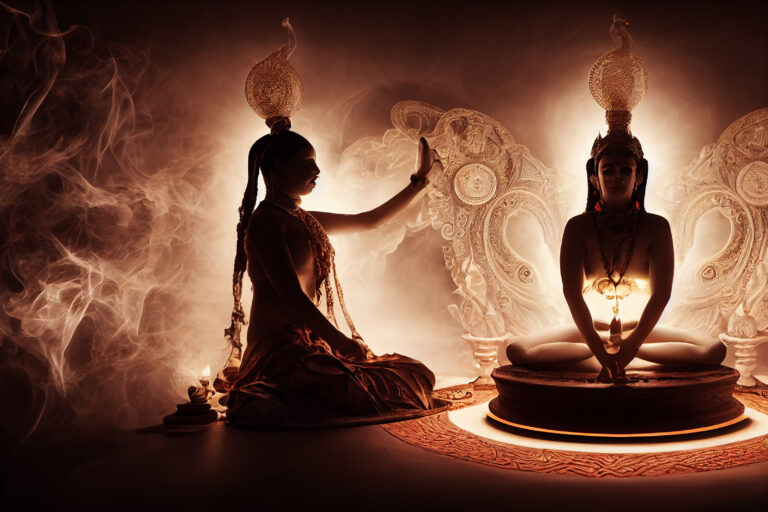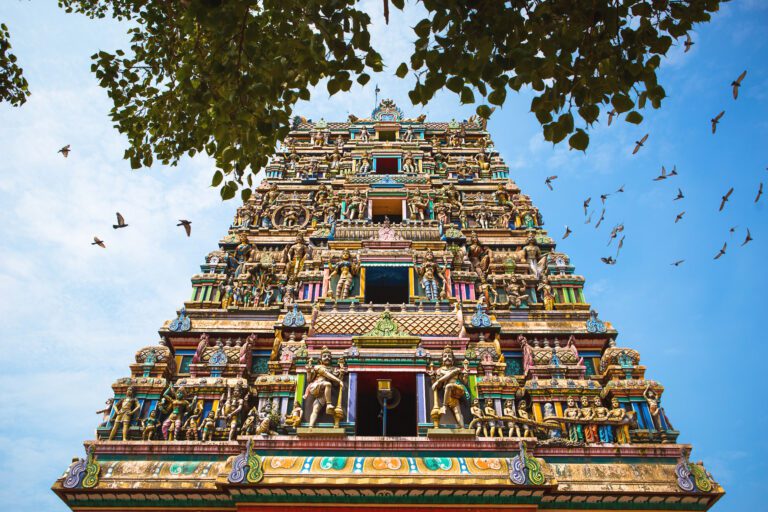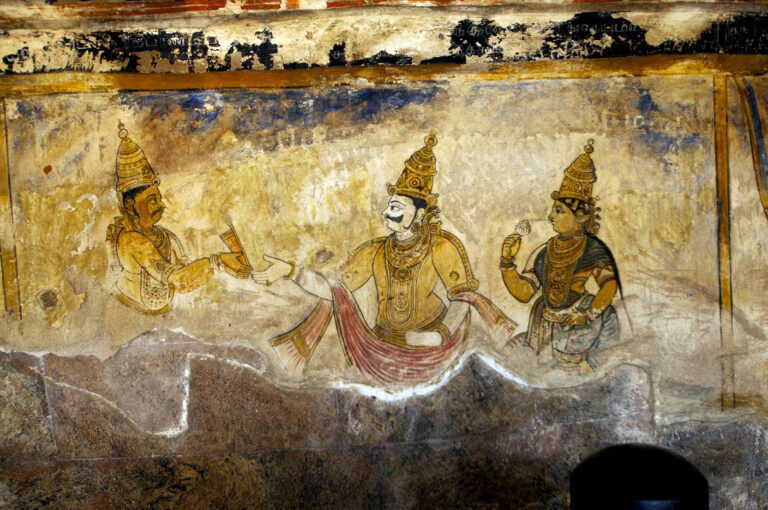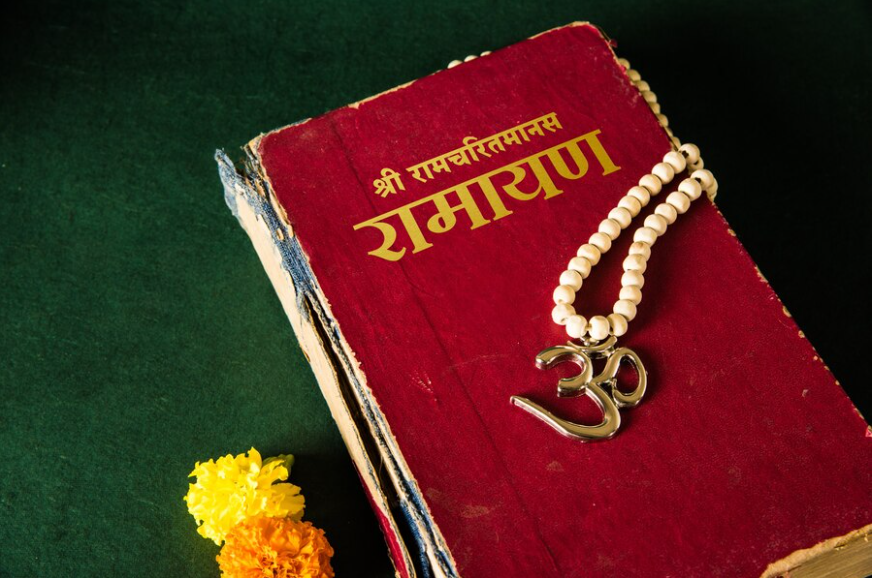What is Hinduism?
It is often referred to as Sanatan Dharma, is the oldest major religion in the world and encompasses a diverse set of beliefs, practices, and traditions that have evolved over thousands of years in the Indian subcontinent. It doesn’t have a single founder or central religious authority.


In the simplest terms, Sanatan Dharma emphasizes the belief in karma (the law of cause and effect), dharma (moral and ethical duties), and moksha (liberation from the cycle of reincarnation). It also involves the worship of various deities, rituals, meditation, and the study of sacred texts like the Vedas and Upanishads. Hindu mythology is a significant part of Sanatan Dharma, with numerous gods and goddesses, epics like the Mahabharata and Ramayana, and rich folklore and stories.
It is a complex and diverse religious and philosophical system rooted in the Indian subcontinent. It encompasses a wide range of beliefs, practices, and traditions that have evolved over millennia. Central tenets include karma (the law of cause and effect), dharma (moral and ethical duties), and moksha (liberation from the cycle of reincarnation). Hinduism’s pantheon features numerous deities, each representing different aspects of the divine, and it has a rich tapestry of mythology, epic stories like the Mahabharata and Ramayana, and a profound spiritual and philosophical heritage found in texts like the Vedas and Upanishads.

Where did Hinduism originate?
Hinduism is believed to have originated in the Indian subcontinent, with its roots tracing back thousands of years. It developed over time and evolved from the ancient religious and cultural practices of the people in the region. The Indus Valley Civilization, one of the world’s oldest civilizations, is often associated with early aspects of Hinduism. The sacred texts of Hinduism, such as the Vedas and Upanishads, also contribute to its ancient origins in India.
Facts about Hinduism:
Ancient Origins: Hinduism is one of the world’s oldest religions, dating back thousands of years. Its roots are deeply embedded in the rich history of the Indian subcontinent.
Diverse Beliefs: Hinduism is incredibly diverse, embracing a wide range of beliefs and practices. It is not a monolithic religion but rather a tapestry of various traditions and philosophies.
Reincarnation and Karma: Central to Hinduism is the belief in reincarnation, where the soul undergoes a cycle of birth, death, and rebirth. Karma, the law of cause and effect, plays a crucial role in shaping one’s destiny.
Many Deities: Hinduism boasts a multitude of deities, each representing different aspects of the divine. From major gods like Brahma, Vishnu, and Shiva to a vast array of goddesses and regional deities, the pantheon is expansive.
Sacred Texts: The Vedas, Upanishads, Bhagavad Gita, and epics like the Ramayana and Mahabharata form the backbone of Hindu scriptures. These texts provide philosophical insights, moral guidance, and captivating narratives.
Temple Traditions: Hindu worship often takes place in temples, each with its unique rituals and ceremonies. The architecture and artistry of these temples reflect the cultural diversity within Hinduism.
Festivals Galore: Hinduism is celebrated with a myriad of festivals throughout the year. From the colorful Holi to the spiritually significant Diwali, each festival carries its own traditions and meanings.
Yoga and Meditation: Hinduism has greatly influenced the practice of yoga and meditation. The pursuit of spiritual enlightenment and self-realization is a key aspect of these ancient disciplines.
The question of “Who is the founder of Hinduism?” frequently arises, and the response is that Hinduism doesn’t have a specific founder. Unlike some other religions, Hinduism evolved organically over centuries, shaped by a diverse range of cultural, philosophical, and religious influences. It is a complex tapestry woven together by ancient sages, seers, and the collective wisdom of the people over time. So, the essence of Hinduism lies not in a singular founder but in the rich and continuous exploration of spiritual and philosophical ideas across generations.
Is sanatan dharma different from hinduism if yes/no why?
The terms “Sanatan Dharam” and “Hinduism” are often used interchangeably, but there is a nuanced difference in how they are understood.
Sanatan Dharma: It is a term that some people prefer to use to describe what is commonly referred to as Hinduism. “Sanatan” means eternal, and “Dharma” roughly translates to duty, righteousness, or way of life. So, this can be interpreted as the “eternal way of life” or the “eternal religion.” Some proponents of this term argue that it better represents the spiritual and philosophical tradition that has evolved in the Indian subcontinent over thousands of years, emphasizing its timeless and all-encompassing nature. They see it as more than just a religion but as a comprehensive way of life that includes various spiritual, philosophical, and cultural elements.
Hinduism: “Hinduism” is a term that is more commonly used in contemporary language and in the context of the academic study of religion. It is a broad, umbrella term that encompasses a wide range of religious and philosophical beliefs, practices, and traditions that have developed in India over millennia. Hinduism is a complex and diverse religious tradition with no single founder, central religious authority, or universally accepted set of beliefs. It includes various schools of philosophy, sects, and diverse practices that can vary significantly from one region or community to another.
In summary, while “Sanatan Dharma” is sometimes used to emphasize the eternal and holistic nature of the religious and philosophical tradition often called “Hinduism,” they essentially refer to the same body of beliefs and practices. Whether you use one term or the other often depends on personal preference, cultural background, or philosophical perspective. Both terms refer to the spiritual and philosophical traditions of the Indian subcontinent, which include a wide array of beliefs, practices, and cultural elements.
Some in-depth details about Sanatan Dharma:

Hinduism has a vast and rich collection of sacred texts, including:
Vedas: The oldest and most revered scriptures, consisting of four main collections: Rigveda, Yajurveda, Samaveda, and Atharvaveda.
Upanishads: Philosophical texts that explore the nature of reality, the self (Atman), and the ultimate reality (Brahman).
Bhagavad Gita: A 700-verse scripture within the Mahabharata that presents a dialogue between Lord Krishna and Arjuna, discussing duty, righteousness, and the path to spiritual enlightenment.
Ramayana and Mahabharata: Epic narratives that contain stories of heroism, morality, and divine intervention.
Reincarnation: Hindus believe in the cycle of birth, death, and rebirth (reincarnation) until moksha is achieved. One’s actions in each life affect their future lives.
Diversity of Deities: Hinduism features a multitude of gods and goddesses, each representing different aspects of the divine. Some of the most prominent deities include Brahma (the creator), Vishnu (the preserver), Shiva (the destroyer), and Devi (the divine mother).
Practices and Rituals: Hindu rituals vary widely but often include offerings, prayers, meditation, yoga, and visits to temples. Festivals like Diwali, Holi, and Navaratri are celebrated with great enthusiasm.
Caste System: While not an intrinsic part of Hinduism, the caste system has historically been associated with it, dividing society into social groups with specific roles and privileges.
Influence and Global Spread: Hinduism has had a profound impact on Indian culture, philosophy, art, and architecture. In recent centuries, it has also spread to other parts of the world, with Hindu communities established in various countries.
It is a deeply philosophical and spiritual tradition that continues to evolve and adapt to contemporary times while preserving its ancient wisdom and practices. Its rich tapestry of beliefs and practices offers individuals a diverse array of paths to spiritual realization and enlightenment.
How old is sanatan dharma ?
It is one of the oldest religious and philosophical traditions in the world. Its exact age is challenging to determine due to its ancient origins and the evolving nature of religious and cultural practices over millennia. However, we can provide a general overview of its historical development:
Indus Valley Civilization (approx. 3300-1300 BCE): Some aspects of what would later become Hinduism can be traced back to the Indus Valley Civilization, one of the world’s earliest urban cultures. Archaeological discoveries suggest the presence of symbols and practices that could be precursors to certain Hindu concepts, but it’s important to note that the religious and cultural context of that time is not fully understood.
Vedic Period (approx. 1500-600 BCE): The Vedic period marks a significant phase in the development of what we now recognize as Hinduism. The oldest sacred texts of Hinduism, known as the Vedas, were composed during this time. These texts contain hymns, rituals, and philosophical ideas that laid the foundation for Hindu religious thought. The Vedic religion focused on rituals and sacrifices to deities.
Upanishadic Period (approx. 800-200 BCE): The Upanishads, a group of philosophical texts, emerged during this period. They introduced profound metaphysical and spiritual ideas, including concepts like Brahman (the ultimate reality) and Atman (the individual soul), which are central to Hindu philosophy.
Epic Period (approx. 400 BCE – 400 CE): The epic narratives of the Ramayana and Mahabharata were composed during this time. These epics not only tell captivating stories but also convey important moral and ethical teachings. They introduced the concept of dharma, the moral and ethical duty that individuals must uphold.
Classical Period (approx. 200 BCE – 1200 CE): This period saw the development of various schools of Hindu philosophy, including Nyaya, Vaisheshika, Samkhya, Yoga, Mimamsa, and Vedanta. These philosophical systems explored different aspects of spirituality, metaphysics, and ethics.
Medieval and Modern Period (1200 CE – Present): Hinduism continued to evolve with the influence of various dynasties, cultural interactions, and reform movements. The Bhakti and Sufi movements in medieval India emphasized devotion and the importance of a personal relationship with the divine. In the modern era, Hinduism has adapted to changing social and cultural contexts.
In summary, while it’s challenging to pinpoint an exact date for the origin of Hinduism, it is a tradition that has evolved over thousands of years, with its roots extending back to the ancient Indus Valley Civilization and the Vedic period. It has continually absorbed new ideas, practices, and philosophies, making it a rich and diverse religious tradition that has stood the test of time.
Varnashrama-dharma, as an integral part of Sanatan Dharma
Varnashrama-dharma, as an fundamental a part of Sanatan Dharma, lays out a framework for people to steer a lifestyles in alignment with their ethical and societal duties. It emphasizes the importance of pleasurable one’s obligations and responsibilities to society, own family, and self, whilst also nurturing non secular increase.
In the context of Sanatan Dharma, Varnashrama-dharma’s varnas (castes) and ashramas (degrees of existence) offer steerage on how people can lead a balanced and purposeful life. It’s crucial to be aware that at the same time as this system has developed over the years, the essence of dharma stays a essential pillar of Sanatan Dharma.
Today, as Hinduism keeps to adapt to the challenges of the current global, the standards of Varnashrama-dharma are being reinterpreted to emphasise equality, inclusivity, and the concept that one’s really worth isn’t decided via birth but by their moves and man or woman. This evolution displays the dynamic nature of Sanatan Dharma, wherein historical information coexists harmoniously with contemporary values.
So, whether one seeks to delve into the profound religious teachings of Sanatan Dharma or explore the ethical dimensions of Varnashrama-dharma, the adventure within Hinduism offers a pathway closer to personal increase, ethical living, and non secular enlightenment.
